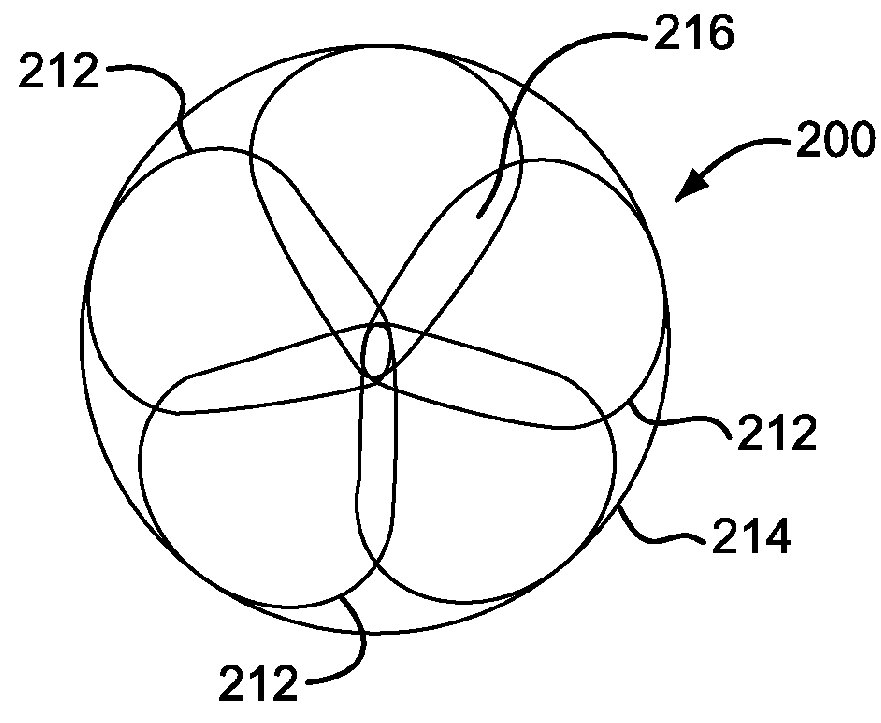Sealing device and delivery system
a technology of occluder and sealing device, which is applied in the field of sealing device, can solve the problems of repositioning, difficult positioning of self-expanding devices, and cumbersome loading,
- Summary
- Abstract
- Description
- Claims
- Application Information
AI Technical Summary
Benefits of technology
Problems solved by technology
Method used
Image
Examples
example 1
[0117]A sealing device similar to FIG. 1 was manufactured using the following components and assembly process.
[0118]An expanded polytetrafluoroethylene material was obtained with the following properties:[0119]Methanol bubble point of 1 psi[0120]Mass / area of 2.2 grams / square meter[0121]Longitudinal maximum load of 1.6 kg / inch[0122]Thickness of 0.0003 inch[0123]Longitudinal matrix tensile strength of 92000 psi
[0124]The following test methods and equipment were used to determine the above-mentioned properties: Methanol bubble point was measured using a custom built machine with a 1 inch diameter foot, a ramp rate of 0.2 psi / second and a liquid media of methanol. Length and width of the material were measured using a metal ruler. Mass / area was measured using a balance (Model GF-400 Top Loader Balance, ANG, San Jose Calif.) with a 36×5 inch sample. Longitudinal maximum load was measured using a materials test machine (Model 5564, Instron, Grove City, Pa.) equipped with a 10 kg load cell...
example 2
[0143]A sealing device similar to FIG. 6 was manufactured using the following components and assembly process.
[0144]Expanded polytetrafluoroethylene and expanded polytetrafluoroethylene with a thin layer of FEP (fluorinated ethylene propylene) materials similar to that described in Example 1 were obtained.
[0145]A distal eyelet was formed by first obtaining a length of 10% platinum drawn filled nitinol wire (Fort Wayne Metals, Fort Wayne, Ind.) with a diameter of about 0.23 mm. This wire was labeled “first wire”. A free end of the first wire was doubled on itself to create an open-ended loop and the open-ended loop was inserted into the button. The button was then inserted onto the keyed center pin. The button was shaped to have an opening through the center to accommodate the keyed center pin and to have features that allow it to rest securely in the winding jig. The keyed center pin (major axis of about 5.79 mm and minor axis of about 0.25 mm and length of about 10.16 mm) was inser...
example 3
[0154]An handle assembly similar to FIG. 8 was manufactured using the following components and assembly process.
[0155]Components for the handle assembly were fabricated using an injection molding process. The parts were fabricated by Contour Plastics (Baldwin, Wis.) using Lustran® 348. This material was suitable for use in medical devices and has an advertised tensile strength of 48.2 MPa and a tensile modulus of 2.62 GPa. Nine parts were fabricated using this injection process and Lustran® 348. The parts included the second linear actuator, flushing gasket retainer, a first linear actuator, retrieval cord lock, mandrel control lever, left body housing, sizing insert, right body housing, and a lock release actuator.
[0156]Other materials required for the assembly of the handle were purchased items. A catheter tube formed with a layup process commonly known in the arts was ordered (Teleflex Medical, Jaffrey, N.H.) with an I.D. of 0.048 mm and an O.D. of 0.33 mm and a platinum iridium ...
PUM
 Login to View More
Login to View More Abstract
Description
Claims
Application Information
 Login to View More
Login to View More - R&D
- Intellectual Property
- Life Sciences
- Materials
- Tech Scout
- Unparalleled Data Quality
- Higher Quality Content
- 60% Fewer Hallucinations
Browse by: Latest US Patents, China's latest patents, Technical Efficacy Thesaurus, Application Domain, Technology Topic, Popular Technical Reports.
© 2025 PatSnap. All rights reserved.Legal|Privacy policy|Modern Slavery Act Transparency Statement|Sitemap|About US| Contact US: help@patsnap.com



